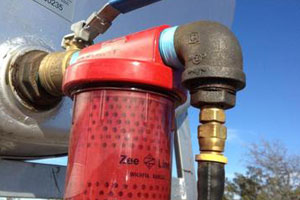Storage tanks can be used to store extra fuel during bad economic downturns or spikes in the price of crude oil. They are one way you can have a small insurance policy against economic shifts. This post will go over the history of fuel tanks, the evolution of their safety and technical standards, and common piping types.
The history of fuel storage tanks
Humans have been using tanks to store all sorts of liquids for thousands of years. The word “tank” can be traced back to bronze-age civilizations in India. “Tank” is now a broad term that is used to describe all sorts of liquid-storage facilities, from reservoirs to manufactured containers. However, starting in 1859, the technology for fuel tanks changed dramatically. You have probably seen the old wooden storage tanks used to store water. With the discovery of oil, heavy duty containers were needed, so iron-riveted tanks replaced wood.
The discovery of oil coincided with the Industrial Revolution, which changed tank production from hand-made techniques to machine-made. Industrialists once relied on craftsmen who insisted that tanks needed to be built based on their experience with different materials. But, this process ran into serious quality issues. It was later found by Charles Dudley that different steels are better at storing oil, which is highly corrosive. These discoveries eventually led to the founding of the American Society for Testing and Materials, which developed standards for manufacturing steel.
Safety and corrosion specifications
The first safety standards were developed in 1904 by the National Board of Fire Underwriters. Eventually, these evolved into the national standards that are used by the American Petroleum Institute and the Petroleum Equipment Institute today.
Technical specifications were also developed to tackle corrosion issues. Experts from the National Association of Corrosion Engineers developed ways to prevent damage to surrounding property from corroded tanks and pipelines. Eventually, these technical adjustments evolved to deal with gas, oil, and other fuels using protective linings and coatings, treatments, materials, and design.
Types of pipes for fuel storage tanks
The right piping material depends on your underground fueling system. The piping is semi-buried and connected to either your dispenser sump, UST sump, or transition sump. The piping system is one of the pieces of your tank system that is often overlooked in inspections. Your system should come equipped with certain safety features such as back-up generators and fuel dispensers.
One of the most important and overlooked aspects of your piping system is the material used to make the pipes. The following will go over the types of piping material and their pros and cons. These are:
- Flexible pipes
- Semi-rigid pipes
- Fiberglass reinforced plastic
- Pre-insulated piping
Flexible pipes
Flexible pipes are ideal for fuel storage tank systems because they can work in any weather and site configuration. They can be used in suction and pressure applications and are available in a broad range of runs. The main problem with flexible pipes is that you need to install them with enough slack to ensure that they can flex in extreme weather conditions.
Semi-rigid pipes
These pipes are welded to ensure that they don’t develop leaks. They are connected to the dispenser so the joints don’t break down over time as well. You can expect these systems to maintain their integrity for at least 10 years. The main issue with these fuel storage tank pipes is the cure time to weld them, which can take at least 20 minutes.
Fiberglass reinforced pipes
The benefit of these pipes is their low costs and longevity. They experience less corrosion and other issues as well. They also have smooth wall bore characteristics and large diameter couplings, which are less restrictive. The issue is that they have relatively short pipe runs, so they are labor intensive to install.
Pre-insulated pipes
Finally, pre-insulated pipes are great for buildings that use furnaces or boilers and require double-insulated walls to maintain fuel viscosity. These pipes combine the strength of steel and the resistance to corrosion of fiberglass.
High-quality bulk fuel products and services
At Kendrick Oil Company, we distribute a wide variety of wholesale Fuels and Related Services at great prices. If your business needs fuel, give us a call at (800) 299-3991 today or Send Us an Email for more information. We have locations in Texas, New Mexico, Oklahoma, Kansas, Colorado, and Louisiana.

